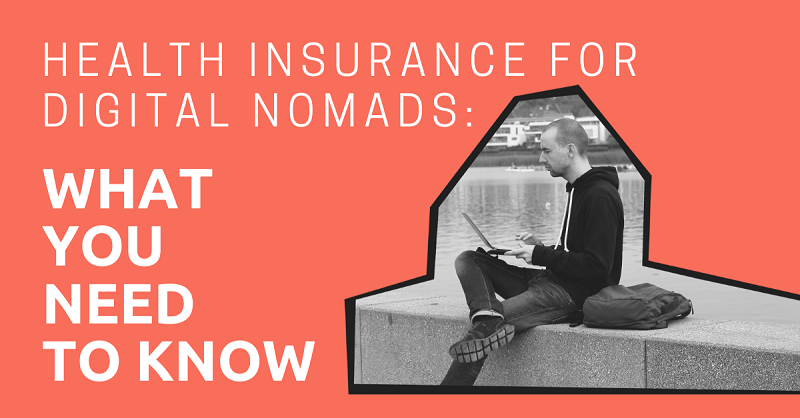
The lure to being a digital nomad is of course the freedom to move around at will, to work from anywhere in the world, at any time to suit yourself; yet this enviable lifestyle doesn’t come without its challenges.
Crossing borders and being in unfamiliar locations without a support network around you can be tricky to navigate at the best of times and nigh on impossible when sick.
From not knowing where to find a reliable and suitably-qualified doctor, to the worry of covering the cost of expensive private treatment far away from home, there are a myriad of reasons why it is essential that anyone who chooses this nomadic lifestyle ensures they have adequate health insurance in place.
Read this article before embarking on your new adventure and find out everything you need to know about health insurance for digital nomads.
Alternatively, check our expat health insurance comparison page to find out a suitable option for you.
This article will take approximately 36 minutes to read. Don't have the time right now? No worries. You can email the ad-free version of the article to yourself and read it later!
Disclaimer: This article may include links to products or services offered by ExpatDen’s partners, which give us commissions when you click on them. Although this may influence how they appear in the text, we only recommend solutions that we would use in your situation. Read more in our Advertising Disclosure.
Contents
- Do You Need Health Insurance?
- Points to Consider
- Insurance Options
- Comparison Websites
- Insurance Brokers
- Insurance Agents
- Insurance Plans Explained
- Choosing the Right Plan
- Now, on to You
Do You Need Health Insurance?
As the quote by John Allen Paulos goes ‘uncertainty is the only certainty’, and this is especially true for ill health. While you may well set out on your new nomadic work-life adventure the very picture of rude health, you can never be sure that sickness or injury doesn’t lie just around the corner.
Good health insurance can give you the confidence and peace of mind before setting forth on your travels that any unexpected medical care and costs will be taken care of.
If you are questioning why you might need health insurance then consider these factors…
Cost & Quality
As a foreigner in another country, local health care services are rarely, if ever, available for free, and for many people accessing private health care is preferable anyway due to the increase in convenience, speed, and better quality service on offer.
Even just being able to speak to, and understand, a doctor in English may be reason enough for you to head to a private clinic.

Private healthcare costs vary wildly across countries and continents and what might be a low-cost, or even free, appointment in your home country could leave you gasping for breath in a country such as China, Germany, or Singapore, where health care is very expensive.
Having health insurance not only means that the costs are covered but that you can even choose which doctor or hospital you receive treatment in.
Accident or Emergency
Accidents happen. Fact. From coming off a rented motorbike to overnight bus crashes on steep bends, we’ve all heard the horror stories.
In these scenarios you could quickly find yourself with a huge and escalating medical bill with hospital treatment and even emergency evacuation required.
With no insurance coverage, you might find yourself in both ill health and huge debt. You can find a lot of people posting on GoFundMe for this specific reason.
Even a simple accident like a cricket ball in the eye, which my partner managed recently, can lead to several trips to the doctor and a visual field eye test and a bill of more than SGD $1,000. Eye-watering indeed.
Managing your finances
Without a regular and fixed salary, the prospect of unforeseen medical bills can be enough to keep you awake at night.
Buying health insurance and managing your payments in a controlled and affordable way makes sense to even the most free-spirited of us.
Visa Requirements
Some countries, such as Thailand, require proof of some form of insurance that will cover the cost of medical services in their country in order for you to secure some types of visas.
It may be a question of needing, not wanting, insurance in order to step foot into one of your planned destinations.
COVID-19
This seems like a good time to mention the COVID-19 global pandemic and any future ones that might be lingering out there. Many governments, such as in Thailand, have restrictions in place on incoming foreign travellers to provide a health insurance policy as a condition of entry.
Basically they don’t want to pay the associated cost for foreigners in case of death or need of medical treatment from COVID-19.
Most insurance policies will have some level of provision but this will be dependent on you abiding by government travel advisories.
In other words, do your research, read your policy terms & conditions closely and if in any doubt, check with your insurance provider before setting off or changing countries.
Points to Consider
Buying health insurance when living in your home country is generally a relatively straight forward process. You need to think about how much coverage you need (ok, that isn’t a straight forward process I agree, but more on that later) and plug in your personal details and off you go.
But when you are a digital nomad and living life on the move there are a few more considerations you should be aware of.
Let’s look at some of these.
Country of Residence
Insurance policy providers will request both your nationality and your country of residence. This is because where you live affects the cost of your premium.
Health care costs, and thus premiums, are higher for countries such as the US, Singapore, or France in comparison to developing countries such as Cambodia or Peru.
Yet as a digital nomad of no fixed abode, your country of residence might change several times within the lifetime of the policy and you don’t want to be paying a higher premium for Singapore when in actual fact you moved on to Cambodia three months after taking the policy on.
It’s easiest to simply take out a policy from the start that covers you for all the countries you will likely travel in or that is specifically geared towards people regularly on the move.
There are even policies, like this one from SafetyWing, which don’t ask you to nominate a country of residence from the outset.
US Coverage
For the most part, health insurance coverage for a world-wide policy which includes the US pushes premiums up considerably. This is because health care is so expensive across the States.

So consider whether this is something you really need, or perhaps whether you can add it to your existing plan at a later date should you subsequently need it.
Home Coverage
Digital nomads have by definition given up their home residence, so what happens when you need, or want, to visit home for any period of time? Are you still covered?
This is often of particular concern to American citizens for whom healthcare back home is not only very expensive but has to be covered by insurance. If this is important to you, look for a policy such as that from Cigna that offers coverage for between 90 and 180 days back home.
Frequency of Payments
How often do you want to pay for health insurance? Monthly? Quarterly? Annually? Map out your finances and decide what works for you.
Some providers such as SafetyWing offer a subscription-based model, allowing you to pay monthly, while others will offer a preferential price if you pay your premium annually. Decide what works for you and factor that into your research.
Duration of Insurance Plan
If you don’t have a fixed time frame for your journeying, make sure you look for a contract that can keep rolling with you month-to-month, or year-to-year like IMGGlobal, and most importantly that it is renewable while you are still abroad.
You don’t want to have to take a trip home simply to sort the paperwork.
Insurance Options
If you want to have comprehensive health insurance coverage that you can keep until you are old, international health insurance is the best bet.
If you want a cheaper option, you can consider travel insurance. But it mainly covers medical emergencies and accidents. And there’s also a limitation on how many days you can visit a doctor per coverage period.
Digital nomad and travel medical insurance are pretty much the same as travel insurance but you might still be able to keep the plan when moving to a new country.
Local insurance and public insurance are also an option. However, this is more suitable for those who plan to stay in a specific country for a very long time.
Let’s take a look at more details of the different health insurance options that might be relevant to you as a digital nomad.
International Health Insurance
Sometimes referred to as expat health care or global health care, international health insurance is designed for those who are planning to be abroad for a year or more, including digital nomads.
These policies are specifically geared towards health coverage and will likely include in-patient and out-patient treatment, routine appointments, emergency care, elective procedures, and more.
Plans are renewable, can cover you wherever you are in the world, and are seen as very comprehensive offerings often with modular designs so that you can build a package specifically to suit you.
International health insurance is a popular option among digital nomads since you can keep the plan with you even after you move to a new country.

Take Cigna’s Global Insurance Plan for example. With a tiered system of Silver, Gold and Platinum plans, you can choose a package that suits your budget from the outset and then add optional modules such as dental or vision until you have exactly what you need.
The difference in the starting packages is in the overall annual benefit and inclusions – more of which we will cover below.
Meanwhile, the IMG Global Medical Insurance Plan also offers a modular system, with four plans and add-ons and home country coverage included, which is ideal for those thinking they may need to pop back between contracts or for family occasions.
GeoBlue has long been popular with US citizens travelling around the world, but they actually provide a comprehensive international health insurance plan that suits anyone, even if a little confusingly it sits under the website called GeoBlue Travel Insurance.
If you plan to move around Southeast Asia, you can check out ACS health in Asia. It gives you full health coverage for all Southeast Asia countries excepting Singapore.
The GeoBlue Xplorer plan is popular for its option to include USA coverage.
Another international health insurance plan worth looking at is Integra Global, billing themselves as a smaller, more flexible provider that creates plans for those with unique insurance needs and unusual lives. That’ll be digital nomads then!
Local health insurance
Depending on how long you plan to be in any one country, you may consider taking out a local health insurance plan in that country with a local provider.
For some people a local insurance plan is attractive because it is generally lower priced than the alternatives such as an international health plan (see more on that later).
However, the reason for the lower premium is because the coverage is generally limited to health treatment within that country, or at best some element of emergency repatriation for treatment back in that country.
The coverage limits also tend to be lower.
As a digital nomad this has drawbacks. The country that you are currently in may not be renowned for its quality healthcare and should you need treatment you may actually want to seek it in another country.
My friends who live in Bali frequently travel to Singapore to receive a second medical opinion or go straight there for treatment in the first place because the healthcare in Indonesia is not considered very good.
Equally at such time that you want to move on to another country you cannot take the policy with you so you will have to start afresh with a new policy in the next country you land in.
Not only are you giving yourself more paperwork but also had you picked up a major disease or illness, this will now be considered a pre-existing condition by your next insurer which will increase your premiums considerably.
If you do decide local health insurance is for you, then it is recommended that you do your due diligence on the company properly, as insurance business scams are not unheard of in some of the poorer Southeast Asian countries, and always make sure your policy documents are in a language that you understand, not just that of the local territory you are in.
Public Health Insurance
Another option if you plan to be based in one country for a significant period is to look into the public health insurance options.
In some countries, such as Vietnam, foreigners who are living and working there have to contribute to the local social security system, which provides universal health care coverage to the entire population.
In other countries, such as Singapore, only foreigners who hold permanent residence status are able to contribute to the public healthcare system.
On settling into a country for an extended period make sure you understand the expectations and options for public healthcare and insurance.
However, even when contributing to a public system, many expats continue to purchase an additional private health insurance plan. This may be because the public offering is not extensive enough or that the treatment provided is not of a high quality or involves long wait times and limited doctor or hospital choices.
Travel Insurance
The clue here is in the name. Travel insurance is for travellers and it aims to provide coverage for various eventualities associated with travelling…loss or theft of bags, delayed or cancelled travel arrangements, and so forth.
World Nomads is a popular option for travel insurance. Their plans are comprehensive and suitable for digital nomads.

What it is not, is health insurance, and don’t be fooled into thinking so.
Travel insurance will provide coverage specifically for accidents and common illnesses you have when traveling, such as cold and diarrhea only. It certainly won’t cover you should you develop a medical condition such as kidney stones while living and working from your dream beach hut.
You should note that when you need a medical evacuation, your travel insurance might fly you home and then put you in a hospital where your local insurance or public insurance can cover your medical treatment.
It will also cover you for a period of time only, usually at 180 days to 270 days at best.
As a global nomad you are certainly going to need travel insurance, so don’t leave home without it, but this is not the same as actual health insurance and you shouldn’t confuse the two.
If you feel very comfortable that local healthcare costs are low in your countries of choice and you don’t mind taking the risk that you won’t need the doctor for anything serious, then travel insurance might suffice. For the rest of us, we’ll need something a little meatier.
Digital Nomad Insurance
Some policy providers have packaged their travel insurance policies specifically for digital nomads, where you don’t need to nominate a place of residency. SafetyWing offers ‘Nomad Insurance’, a monthly subscription-based product which is really a travel medical product but highly popular because of its ease of starting and stopping the policy at any time and from any place.

At around USD $40 per month it is also perceived as one of the more affordable options. But there’s a limit on how many times you can visit a doctor every 3 months.
Travel Medical Insurance
Travel medical insurance is a bit of travel insurance and a bit of medical insurance. Sure, this will have more coverage than straight forward travel insurance, but the key here is that travel medical policies still only cover you until you return home and do not cover you for non-emergency or elective procedures.
One example is IMG Global’s Visitor Care, which offers coverage for travellers outside of their home country for anything from 5 days to 12 months and is renewable up to 24 months.
The basic premise of these policies is that you are travelling for a fixed period with a view to returning home, so why would you elect to have any non-emergency treatment until you got back to the comfort of your home. Which of course, as a digital nomad, is not the plan at all as you no longer have a fixed home, remember?
Comparison Websites
Websites such as International Insurance or GoCompare pull together a range of providers and policies and present them in a clear way so that you can compare the benefits across all of them and start to identify those which might suit you.
They can also be useful for saving time in securing quotes, as you simply fill in one form on the site and it will push it out to a number of providers, resulting in separate quotes from each of the providers emailed directly to you.
Insurance Brokers
Some of these sites, such as International Insurance, go the extra mile with a team of specialist brokers on hand to help answer your questions and make recommendations to suit your particular set of circumstances.

They understand digital nomad’s unique needs, which is a good way of receiving tailored guidance rather than just a generic set of benefits and costs from a website.
Unlike insurance agents, brokers represent the consumer rather than the insurance company. They work to find a suitable insurance policy for you by listening to and understanding your needs and then researching coverage, terms, conditions, and price to recommend the most suitable policy.
Insurance Agents
Insurance agents, on the other hand, represent a particular insurance company, or small selection of companies, and sell their products to consumers for a commission on each sale.
An agent can assist a consumer in selecting the right insurance but ultimately they represent the insurance company in that transaction, which you obviously need to be mindful of as they might have their eye on the commission rather than you.
Agents are able to complete a full insurance transaction from recommendation to sale, which brokers cannot do, so if you have been receiving advice from a broker they may turn to a trusted agent themselves to complete the sale process. But the key word there is trusted. All brokers and agents have to be licensed in their states and comply with governing statutes and regulations.
Insurance Plans Explained
No one likes to read the small print, especially on insurance plans, but not only is it worth it, it is also important to make sure you understand your policy.
Insurance providers don’t make money by paying out huge settlements to everyone who takes a policy, so naturally there are going to be terms and conditions. Read them. Understand them. Know how they work.
Annual Limit
The annual limit, or benefit, is the total amount which the policy provider will pay out in any one year. This is often the key differentiator between different levels of policies from the same provider, for example the Silver, Gold, and Platinum policies from Cigna which offer USD $1 million, $2 million, and no annual limit levels accordingly.

Which annual limit is the right one is impossible for anyone else to answer except you, but should you find yourself unexpectedly needing a heart transplant in the US, you are looking at a bill of anything up to, or even over, USD $1.5 million for the surgery alone.
On the other hand, if you live in Southeast Asia, then a USD $1 million annual limit should be sufficient.
Coverage Limit
The coverage limit is the amount which the provider pays out for a single claim and is linked to a specific treatment. For example, IMG Global Medical Insurance has a USD $1 million lifetime maximum on transplants.
Area of Coverage
While an international health plan is designed to give you coverage internationally, this is usually with the option of world-wide coverage with, or without, the US.
Adding coverage for the US will push your premiums up considerably as healthcare is notoriously expensive in America, so unless you know your travels will take you to the States, you would be wise to leave it off.
This is where it is useful to have a broker, such as through International Insurance, so that you can ask in advance as to whether you can upgrade the policy to include it at a later date should you need to – though this will of course lead to an increase in your premium at that point.
Optional Coverage Choices
Much like buying a budget airline ticket and adding on your priority seat or early boarding, most insurance policies start with a basic package onto which you can bolt ‘riders’ or ‘optional coverage’ elements at additional cost to your monthly or annual premiums.
These include:
- OPD (outpatient department): an option to claim for expenses incurred without being hospitalised, for example, cost of medicines and minor or day patient procedures
- Dental & Vision
- Medical evacuation and emergency assistance
- Maternity and neo-natal services
Which ones you should add on only you can say, but it is worth understanding and considering them all.
Exclusions
Read this section carefully!
As I’ve already said, insurance providers don’t make money by paying out on claims. There are numerous exclusions under which your insurance policy will not pay out. These will differ between providers and policies so make sure you read your small print carefully before signing up.
Common exclusions include:
Pre-Existing Conditions
As already mentioned, if you have a pre-existing condition it can make purchasing an insurance policy a little more complicated…not impossible, just complicated. A pre-existing condition is an injury or illness that you have had prior to arranging the policy and which continues to affect you now or in the future. Insurance companies deal with this in one of a few ways:
- Full coverage with pre-existing conditions offered at a premium price
- Coverage limitations on treatment for your condition
- Coverage available only after a moratorium period – between 1 and 2 years is the norm
- Standard coverage excluding your pre-existing condition – in other words you can take out the plan for your overall health but it won’t cover you for any treatment related to your condition
While it seems a bit unfair to be penalized for ill-health, especially when it is not through any fault of your own (epilepsy for example), the reality is that if you need coverage for a pre-existing condition, expect to have to dip into your pocket to upgrade your policy.
Extreme Sports
While most providers don’t automatically cover extreme sports such as diving or heli-skiing with their plans, you should be able to add it as a optional extra at the point of purchase or as an add-on while you are away. If unsure, give your insurance agent a quick call to check before you strap on that bungy rope.
The rule of thumb here is to check your policy terms and conditions carefully to understand the exclusions. Opt for a policy that has maximum coverage with minimum exclusions and check out some online reviews or ask friends to get a feel for whether a company uses exclusions a little too freely to avoid a pay-out.
Motorbike Accidents
If motorbikes, mopeds, or other such vehicles are going to feature in your nomadic adventure then make sure you leave home with the correct license.
If in doubt carry both your home license and an international license as if you have an accident without a valid license you are bearing the costs of treatment on your own.

Note, if you fall off the moped because you are drunk, then the alcohol exclusion will kick in and you are definitely no longer covered.
Alcoholism
If you have drunk your own liver to death don’t expect someone else to pick up the bill, and I’m obviously not talking about the bar bill. All costs associated with alcohol or drug abuse, be it from under-the-influence admission, through to treatment for subsequent arising conditions, are not covered by health insurance.
Chronic Conditions
This doesn’t mean that you can’t get coverage if you have a chronic condition such as diabetes, but that you need to declare the condition prior to arranging coverage (see pre-existing conditions below).
The exclusion is around diagnosis timing, and if your condition is diagnosed on signs or symptoms that occur within a certain number of days, usually 30, of the policy period start date, then your provider will not cover the cost.
Self-inflicted Injury
While health insurance is unlikely to be top of your mind if this is exclusion is relevant to you, it is something to be aware of prior to purchasing any policy.
STDs
‘What goes on tour, stays on tour’…or not. Medical expenses for the treatment of AIDS or other STDs are not covered by health insurance. Be warned.
Disaster & Terrorism
Hospitalization as a result of war, riot, strike, nuclear weapons, or other such similar acts are not covered.
Cosmetic Surgery
For those TikTok stars in the making, you had better be sure you are going to make it big if you are considering altering your appearance as part of your new digital nomad identity.
Cosmetic surgery is not included in policies and providers will be careful to ask questions to ensure that nose job was really down to a deviated septum and not just vanity.
Cancellations
If you buy your policy and then change your mind, don’t panic. Most providers offer a ‘cooling off’ period in which you can cancel your policy free-of-charge. But don’t hang around to make your mind up, this period could be as little as fifteen days.
After that you are stuck with your policy until the end of its initial fixed term.
Age Restrictions
It doesn’t take a rocket scientist to work out that as you age, your health declines and thus the likelihood of you calling on your health insurance increases. Insurers frequently put age restrictions in place.

I would suggest it is fairly unlikely that any one aged 74 and over (the age restriction limit offered by IMG & GeoBlue) is going to suddenly become a digital nomad, but you never know, my own father at 79 is pretty adept with his computer, so in this instance you’ll likely want a policy such as Cigna Global which allows customers of any age to apply and will provide coverage for life.
Cost
Pricing out a health insurance plan is like searching for the holy grail. There is no such thing as a straight forward like-for-like comparison on plans because no two people have the same health needs, and seemingly no two plans are the same either, with different levels of coverage, limitations, and exclusions, each of which affect the overall cost of a plan.
In my research, I came across plans from as little as USD $40 a month from SafetyWing for a 25-year-old, single male with coverage limits up to USD $250,000, through to an all-singing, all-dancing, fully comprehensive, worldwide with US policy for USD $8,000 plus from IMG Global.
So rather than trying to give you prices, it is better for you to understand what makes up the cost and how you can manage it to suit your budget.
Premium
This is what they call the cost of your policy. Your premium can be billed monthly, quarterly, or annually. Not only is your premium calculated against your personal health needs, condition, age, location, etc., but it can be reduced through making changes to your co-pay and deductibles.
Co-Pay & Deductibles
Many plans start with a deductible, the amount you pay for treatment or a doctor/hospital visit before your insurance coverage kicks in. Deductibles might range from USD $0 through to USD $10,000. Once this amount has been reached, your insurance coverage will start. This deductible only applies once in the agreed period of policy cover.
Co-payment (or cost-share) after deductible, is an amount you agree to pay for each individual part of the treatment. For example, you might choose a 20% cost share. This means that for each doctors visit covered by your insurance, you will pay 20% of the appointment fee. Cigna offers cost shares of 0% through to 30%.
Out of Pocket Maximum
This is the maximum amount of cost-share that you pay in a single period of cover. This is calculated only after the deductible has been applied. Again, a policy provider such as Cigna will offer an OPM of USD $0, $2,000 or $5,000.
By choosing a higher deductible, co-pay, and OPM, you can bring the overall cost of your premium down; or you can decide to pay more for the premium upfront and relax a bit more about the costs that might come your way afterwards.
Eligibility
Most international health insurance plans will require you to be living in a foreign country for at least three months of a year, but if this is not the case then perhaps you should reconsider your self-styled description as a digital nomad.
Other terms and conditions
Each policy will have a different set of terms and conditions and it is important that you read yours through before signing any agreement and if in doubt, speak to an agent.
Paperwork
Yawn. No one likes paperwork (or should this be called electronic work these days) but we all know it has to be done and frankly, without doing the paperwork you won’t receive a penny from your insurance policy, so it’s worth wrapping your head around it, not it around your head.
Quotation
The first bit of ‘paper’ work is the quotation. All policy providers will offer an online quotation service through their website, where you fill in your details and needs and an initial quotation will wing its way back to you by website.
It can be pretty laborious going through the various providers so my recommendation here is that you use a site such as International Insurance where you only have to plug your details in once and a quote will come back from several different insurance providers in quick succession.
Application
On deciding which insurance to see through, you will need to make a full application. Depending on the type of insurance, this can take a few hours to a few weeks to complete.
If time is of the essence then I suggest you look at a simple start-straight-away policy such as from SafetyWing that you can buy online from anywhere in the world in a matter of minutes and be covered almost as soon as you press the submit button online.

For the bigger international health insurance providers, you are looking at either a moratorium or fully underwritten policy. A moratorium policy means applying an agreed period of time within which any pre-existing or related conditions are not covered.
For example Aetna International underwrites on a 24-month moratorium basis. Any medical conditions that have existed in the 24 months prior to your policy commencing are not covered until you have been free of symptoms and treatment for 24 months after the start date of your plan.
If this is a problem for you, then you are looking at a fully underwritten policy. But be warned these can take 4 to 6 weeks to complete and will likely include the need for a fully assessed medical, so you need to have been planning ahead and purchasing this before you leave home.
Claims
So, you’ve settled nicely into your new life. The coffee-shop written business plan has been submitted and you are waiting for the digital nomad dollars to roll in. Why do the best laid plans always go wrong?
Just when you thought your new life was going swimmingly, something will uproot it. When a motorbike accident happens, a lingering cough turns out to be mycoplasma, or you experience something more serious like heart palpitations, you can be sure you are going to be taking a trip to the doctor or hospital somewhere down the line. What happens then?
If it is an unexpected and emergency visit to the doctor and hospital, then receipts, receipts, receipts are the order of the day. Collect all the paperwork and as soon as you are able you’ll want to put in a call to your insurance provider, update them, and start the claims filing procedure.
All providers have a 24/7 telephone number and/or online customer service system through which you can do this.
Prior Authorization
If you are going to have elective treatment then it is best to call your provider ahead of any visits and check that you are covered, identify which doctors or hospitals you can use, and take it from there.
The larger providers such as Cigna are well known for their huge global networks of trusted hospitals, clinics, and doctors, and sometimes this can be a benefit that might swing them in your favour over another provider.
Renewal
Health insurance is normally signed for a fixed period of time – unless you have taken a monthly rolling subscription with SafetyWing – with the option to renew or extend without having to requalify for coverage.
Many providers offer renewal up to a certain age, some for lifetime. Either way, you will need to make sure that you have updated your provider if there are any changes in your circumstances or medical conditions which they are unaware of.
As I highlighted at the beginning of this article, many insurers assume a place of residence for the purposes of your policy even though they are insuring on an international basis worldwide. It might be that you need to update your insurer that your place of residence has changed as this could affect your premium.
Choosing the Right Plan
You should, by now, have the idea that not all policies are made equal and there are many factors that can affect which policy you choose, from premium price to length of policy term, to area of coverage and so forth. So how do you choose?
The first rule is don’t buy the first policy you see. Take your time and always review several policies and providers, compare the plans and the costs, and match them to your needs. Look at the benefits and look at the co-payments and deductibles and how those affect your premium.
Look at insurance websites and talk to a specialist insurance broker. Sites such as International Insurance are particularly useful as not only do they pull together a number of different providers and information in one place, but they have a team of specialist brokers on hand who can offer knowledgeable and tailored advice to your own individual circumstances.
With good understanding of digital nomads and their unique needs, International Insurance continually receive rave reviews for their knowledgeable and useful fact-based support and patient and professional manner.
Talking to someone before you make the purchase can really help to answer any questions you have and build confidence that you are buying into a plan that is right for you.
You could also use an online discussion forum such as Reddit to ask questions and read reviews from others who have purchased international health insurance to see what they recommend, or to vet a company you are considering taking a policy with.
Now, on to You
At the end of the day, buying health insurance comes back to you. What are your needs? The best policy will be the one which matches your requirements and your budget. Think very carefully about what optional add-ons to put into your policy.
You might want to go cheap, but adding dental and vision could just be the best thing you ever did when you suddenly find yourself needing root canal surgery in Thailand. Dental problems don’t conveniently wait until you are back in your home country.
Or perhaps you already know that you will be hiking in the summer and skiing in the winter, in which case emergency evacuation could be just the ticket should you break your leg and need airlifting out.
Ultimately, it is about making sure you get a plan that is truly portable and renewable while abroad. Think of your international health insurance as being as essential as your laptop. You carry that everywhere with you don’t you? Well, make sure you pack your international health insurance too.







